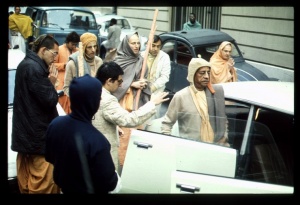SB 1.5.8 (1962)

A.C. Bhaktivedanta Swami Prabhupada
TEXT No. 8
Sri Narada Uvacha Bhavata anuditapraya yasho Bhagawato' malam Yena eba asou na tushyeta manne tad darshanam Khilam.
ENGLISH SYNONYMS
Sri Narada—of the Name, Uvacha—said, Bhavata—by you, Anuditapraya—almost not raised up, Yasho—glories, Bhagawato—of the personality of Godhead, amalam—spotless, Yena—by which, Eba—certainly, Asou—He the Personality of Godhead, Na—does not, Tushayata—be pleased, Manne—I think, Tad—that, Darshanam—philosophy, Khilam—inferior.
TRANSLATION
Sri Narada said that you have practically not broadcast the sublime and spotless glories of the personality of Godhead. Anything that does not satisfy the transcendental senses of the Lord, is considered worthless philosophy.
PURPORT
The eternal relation of an individual soul with the Supreme soul Personality of Godhead is constitutionally one of being the eternal servitor of the eternal master. The Lord has expanded Himself as the servitor living beings in order to accept loving service from them which alone can satisfy both the Lord and the living beings. A scholar like Vyasdeva has had completed many expansions of the Vedic literatures ending in the Vedanta philosophy but none of them have been written with direct glorification of the Personality of Godhead. Dry philosophical speculations even on the transcendental subject of the Absolute, has very little attraction without being directly dealt in the glorification of the Lord. The personality of Godhead is the last word in transcendental realisation. The Absolute realised as impersonal Brahman or localised Super soul Paramatma are less provocative of transcendental bliss than the Supreme Personal realisation of His glories.
The compiler of the Vedanta Darshan is Himself troubled although He is the author of the book. And we can just imagine what sort of transcendental bliss can be derived by the readers and listeners of Vedanta without being explained directly by Vyasdeva the author. Herein arises the necessity of explaining Vedanta Sutra in the form Srimad Bhagwatam by the self same common author.